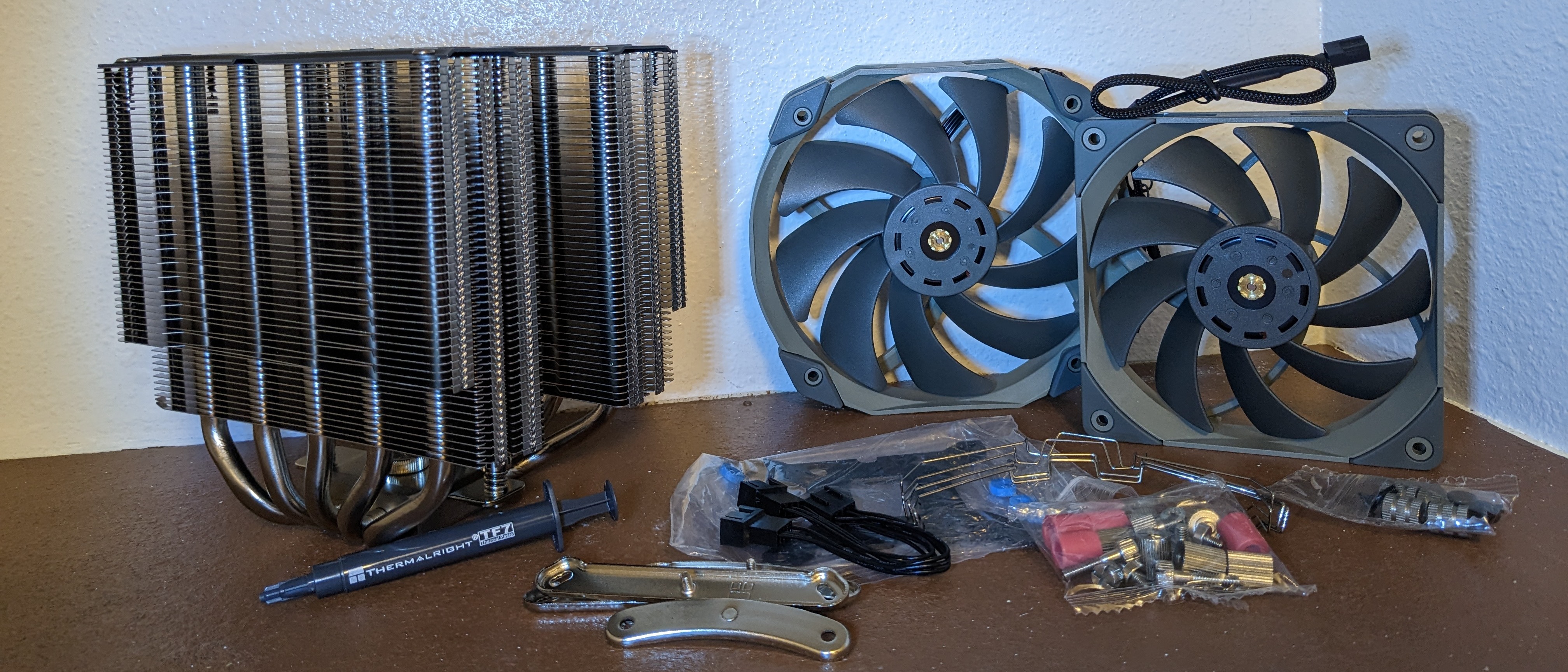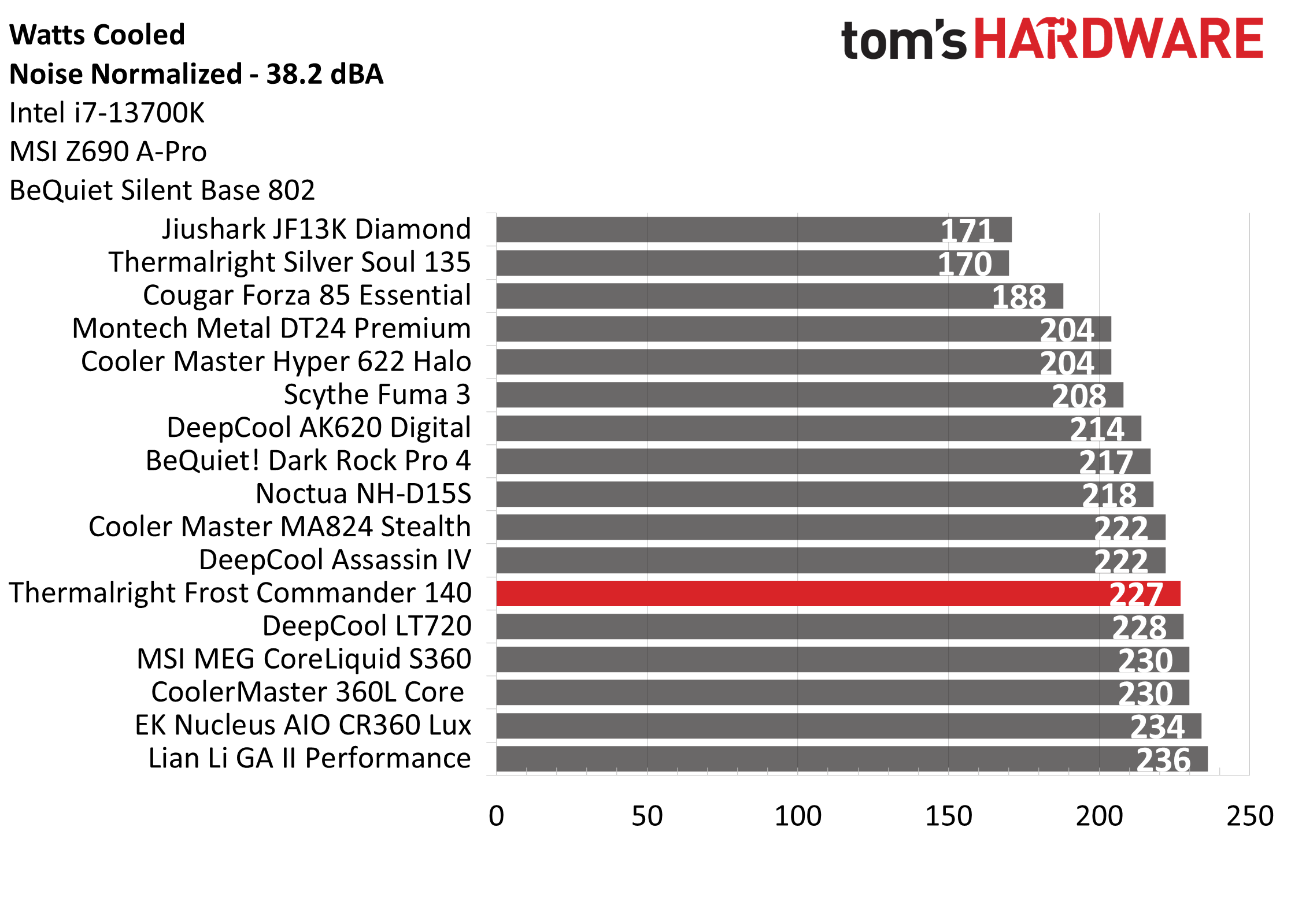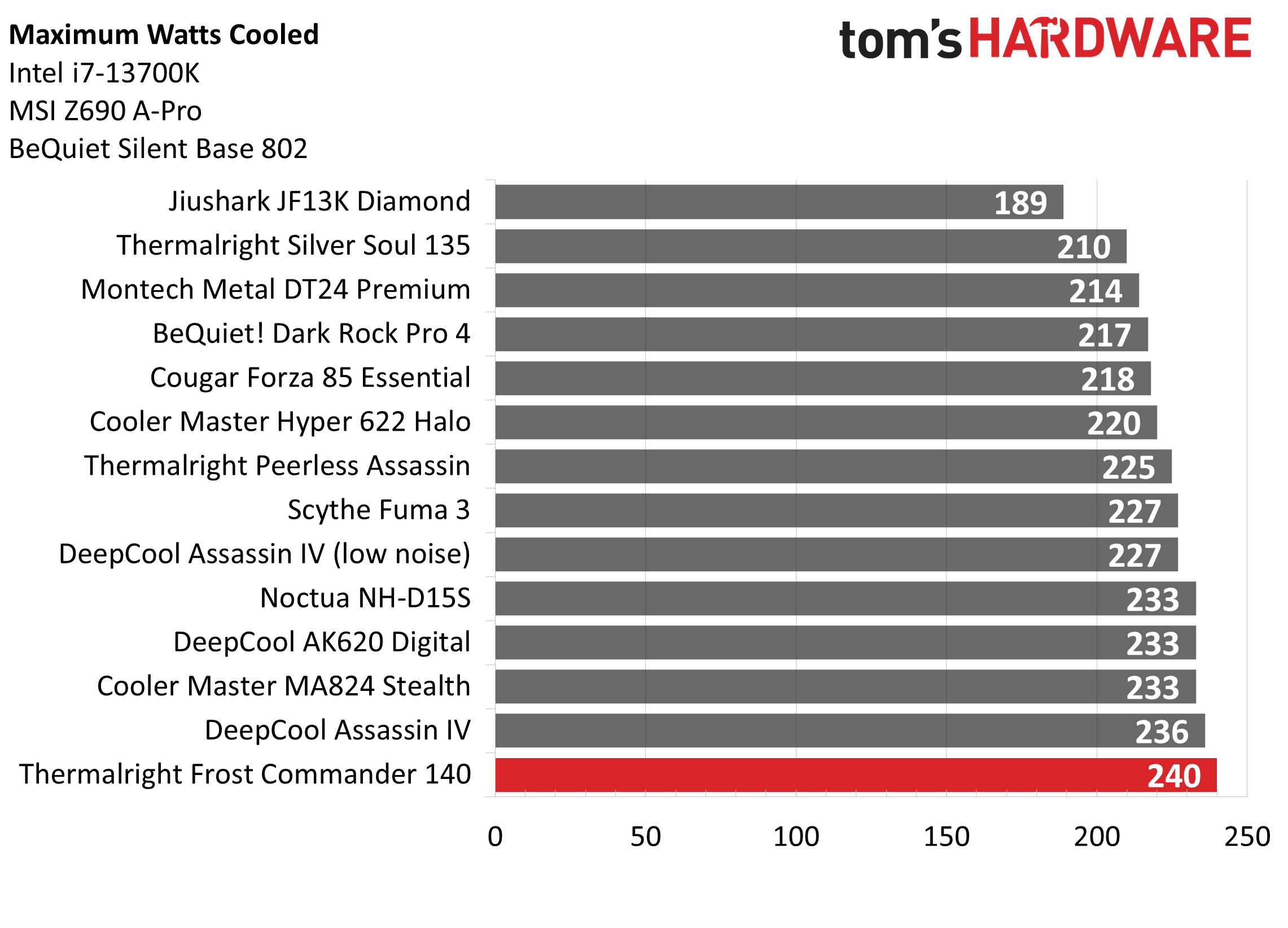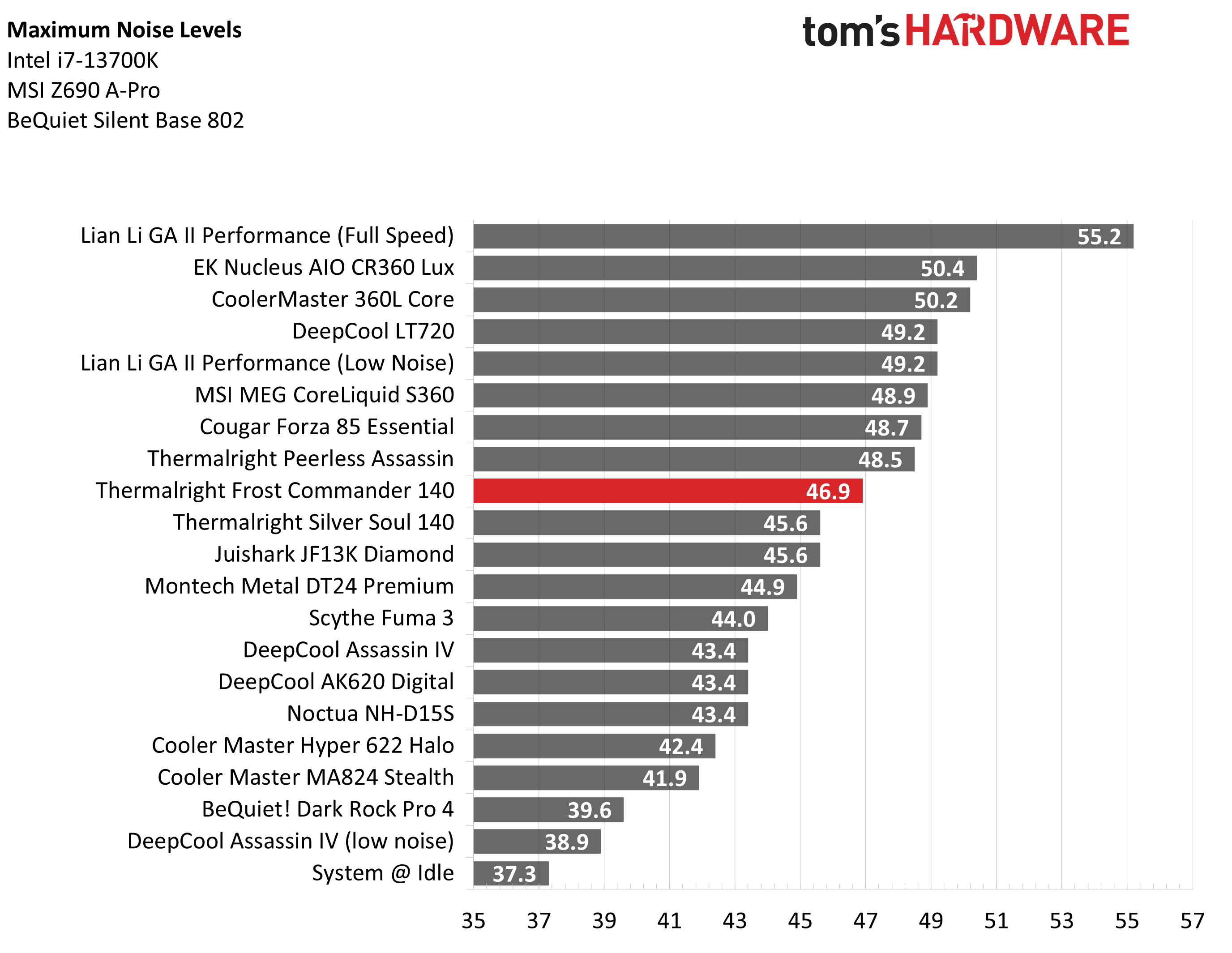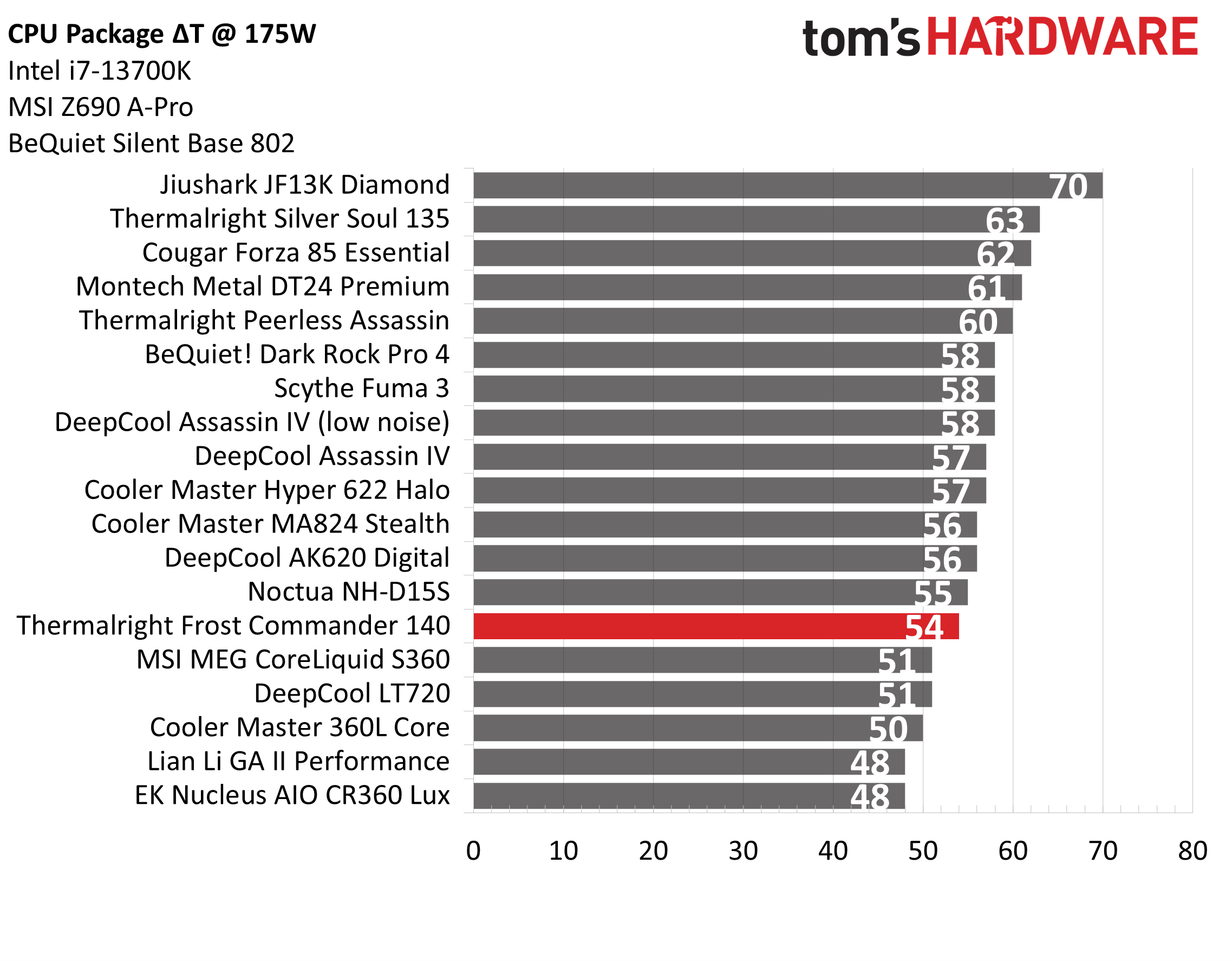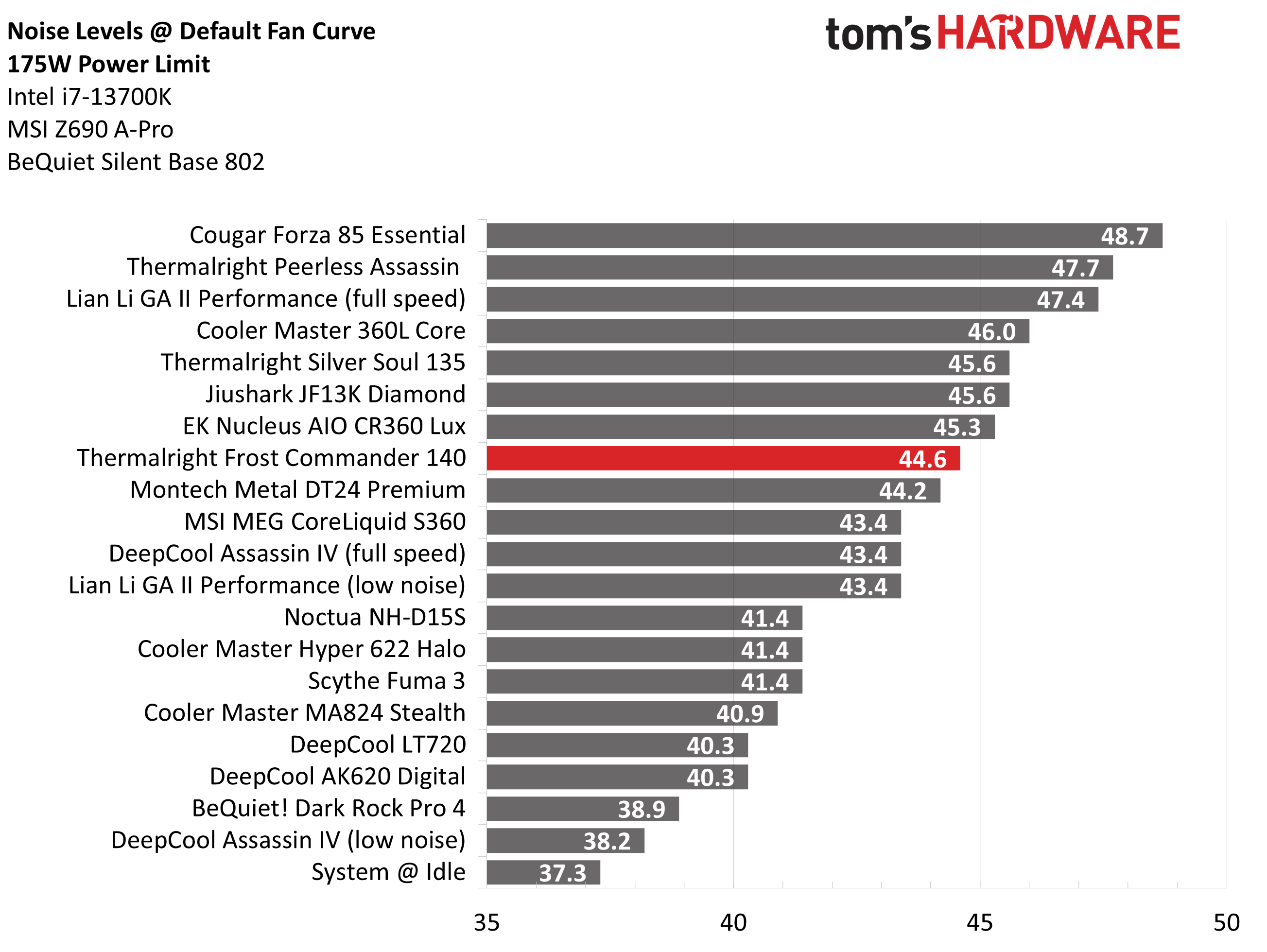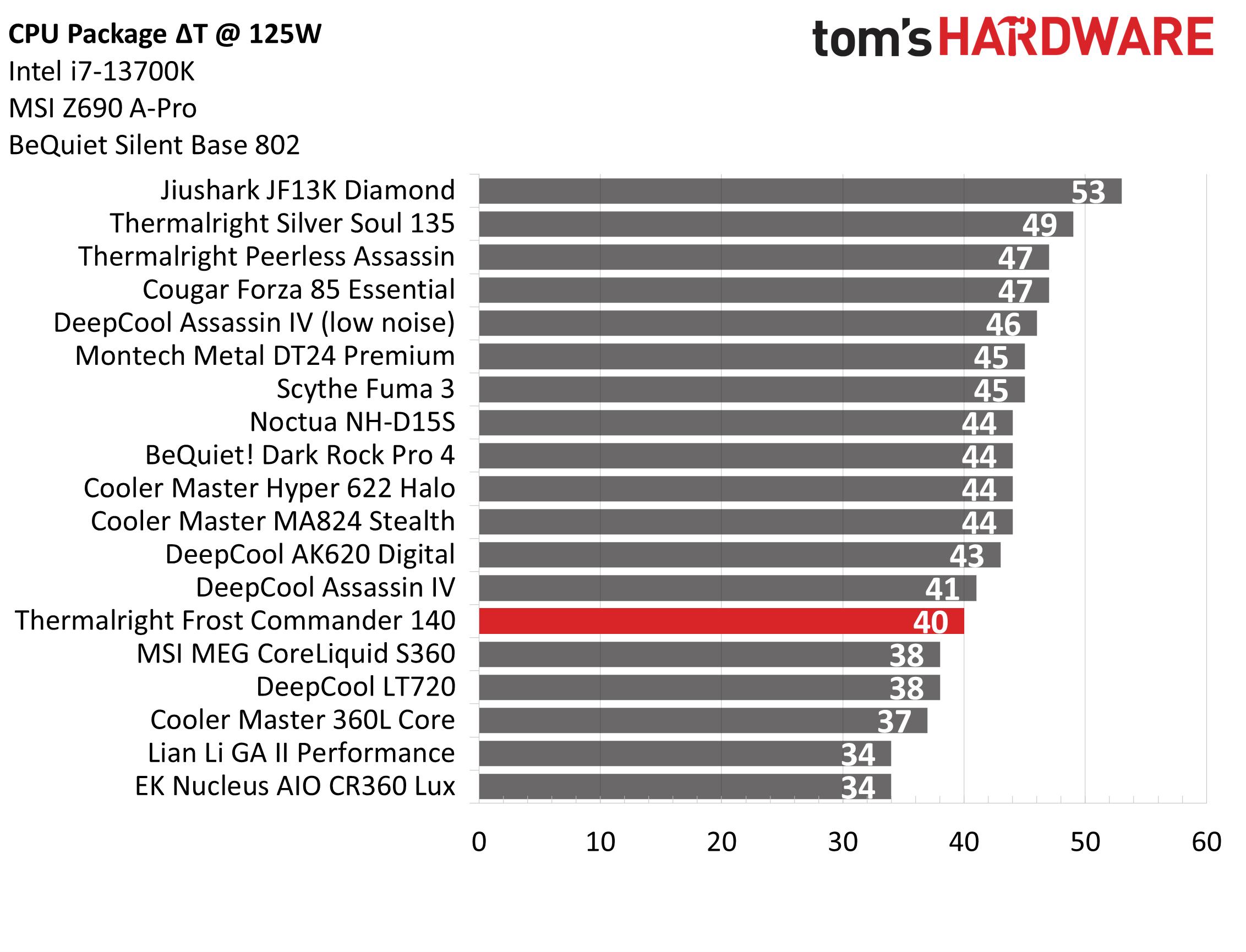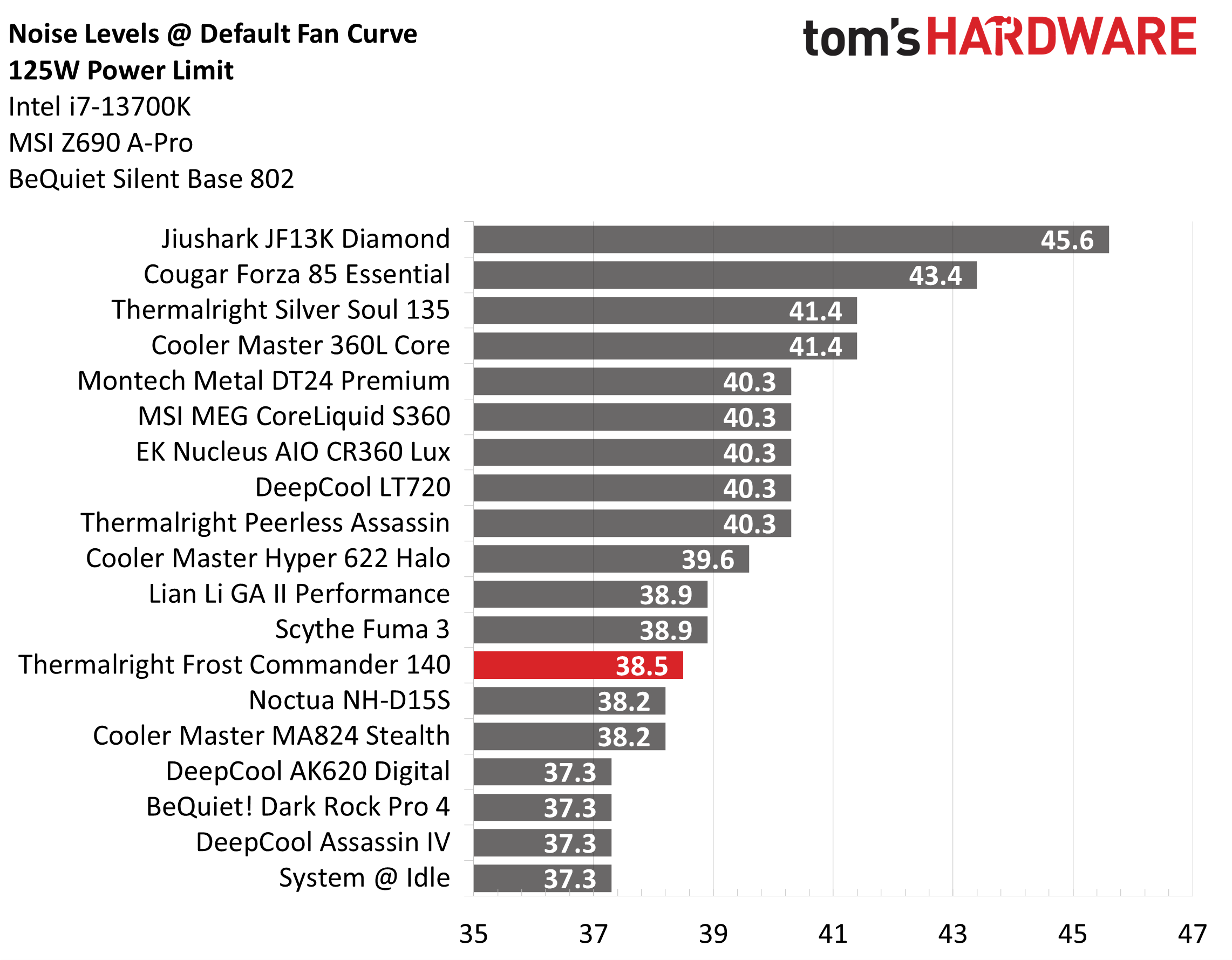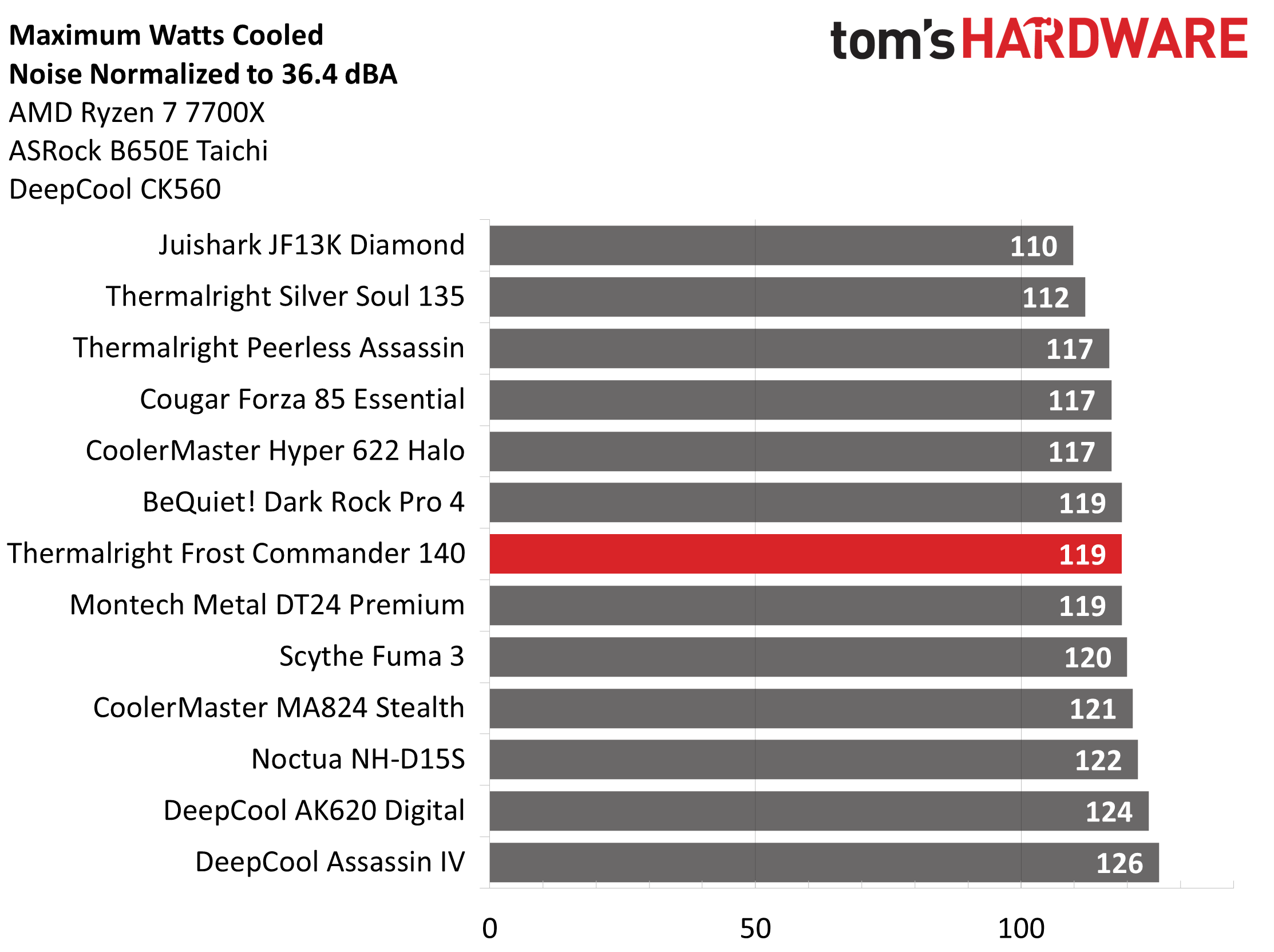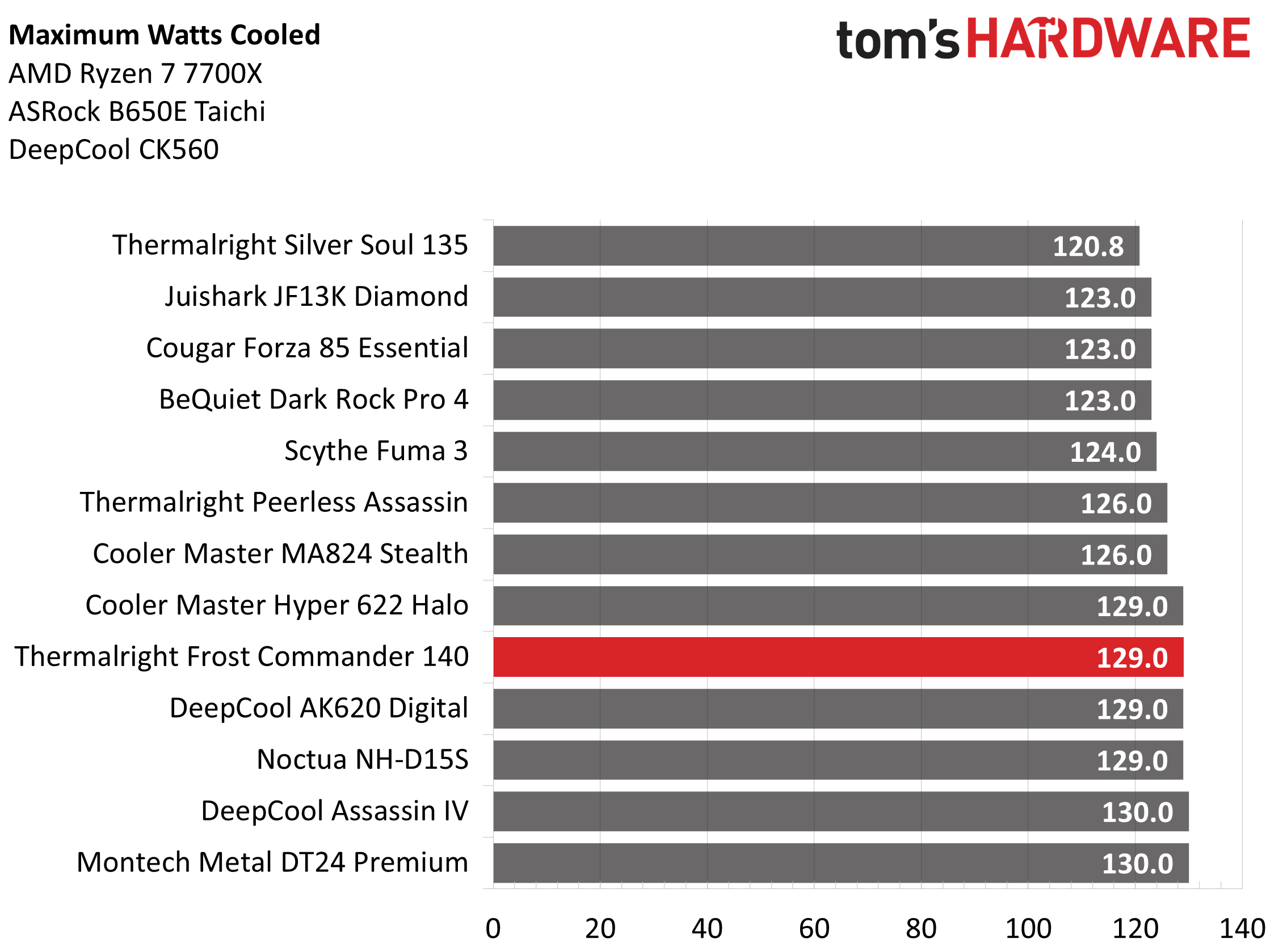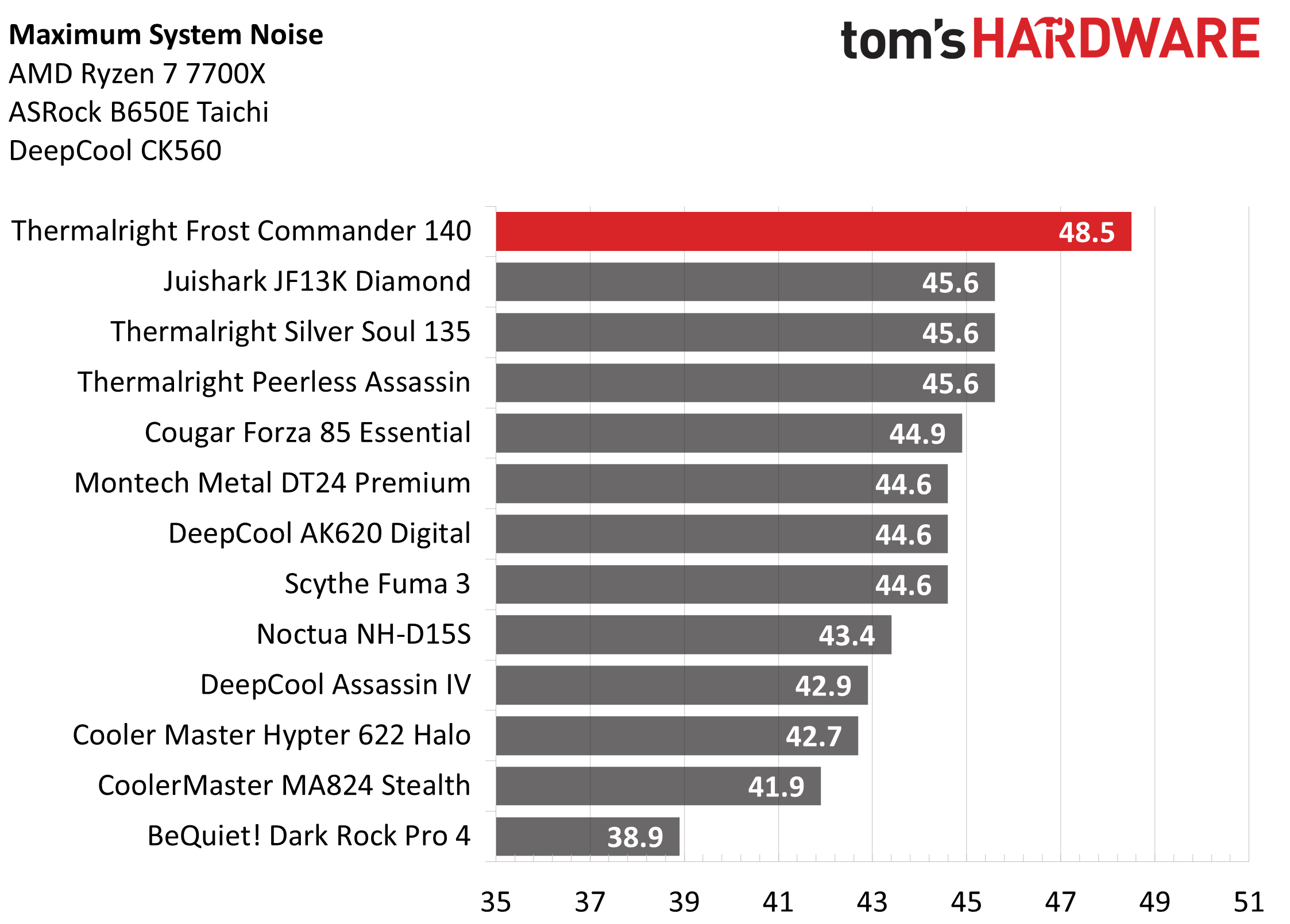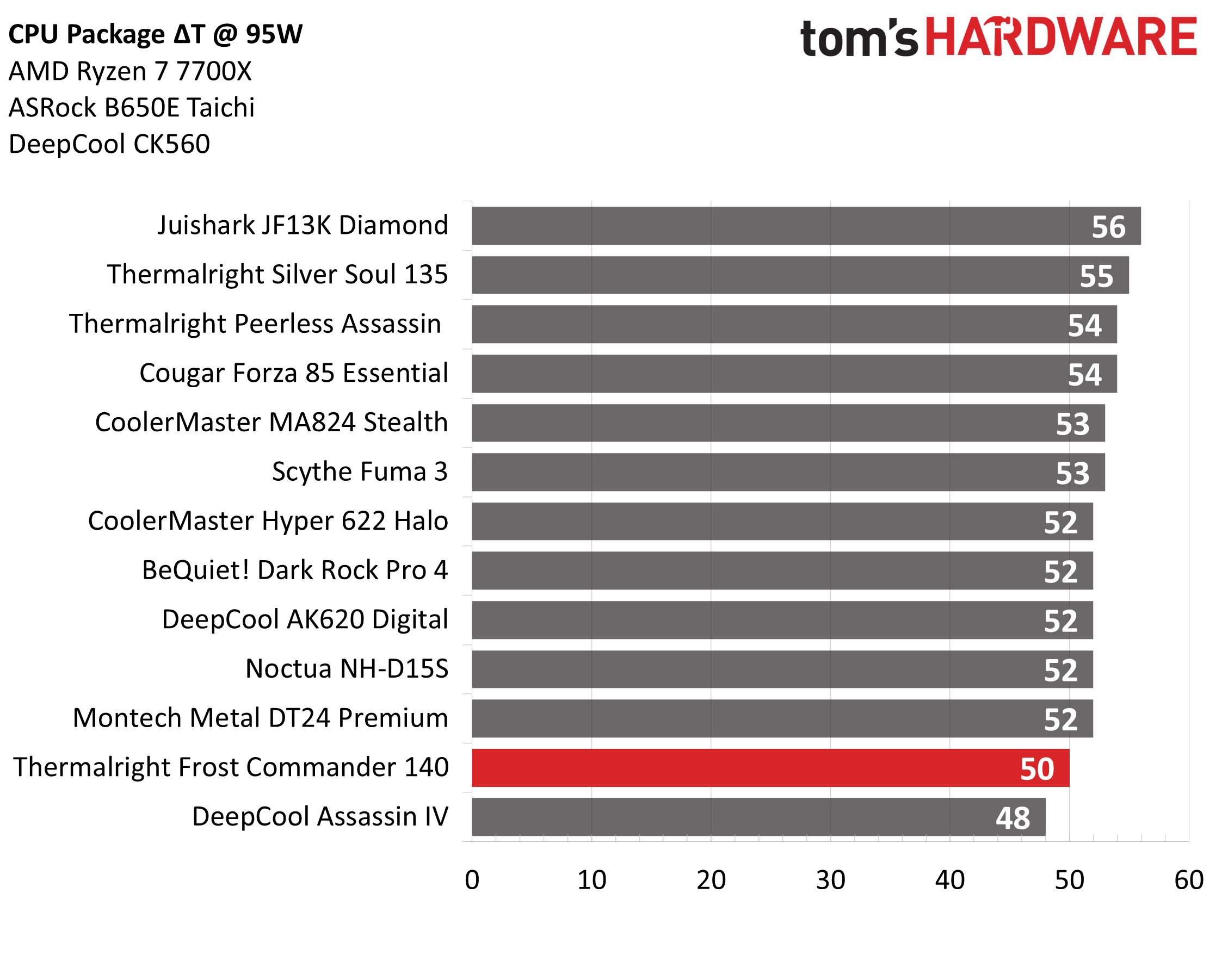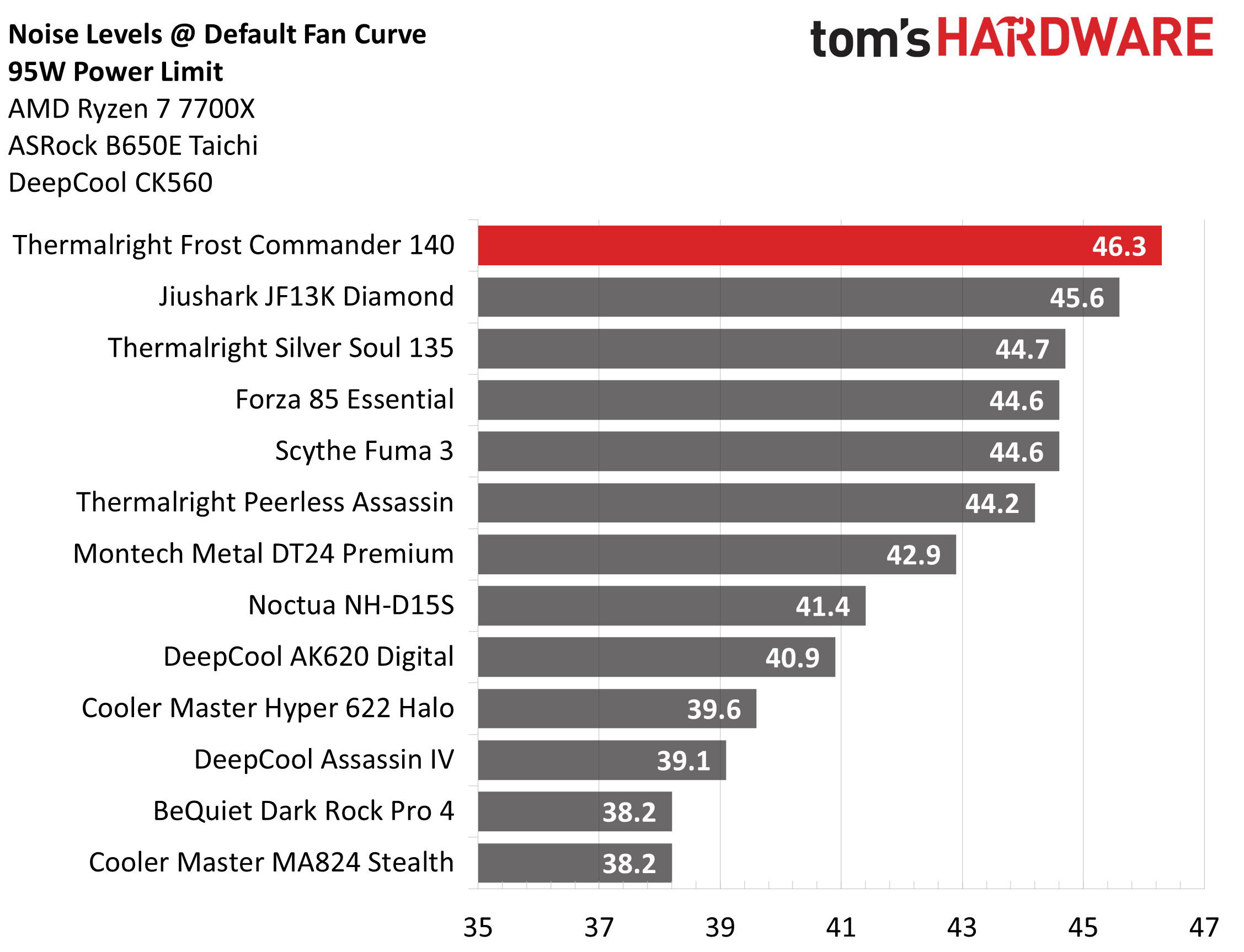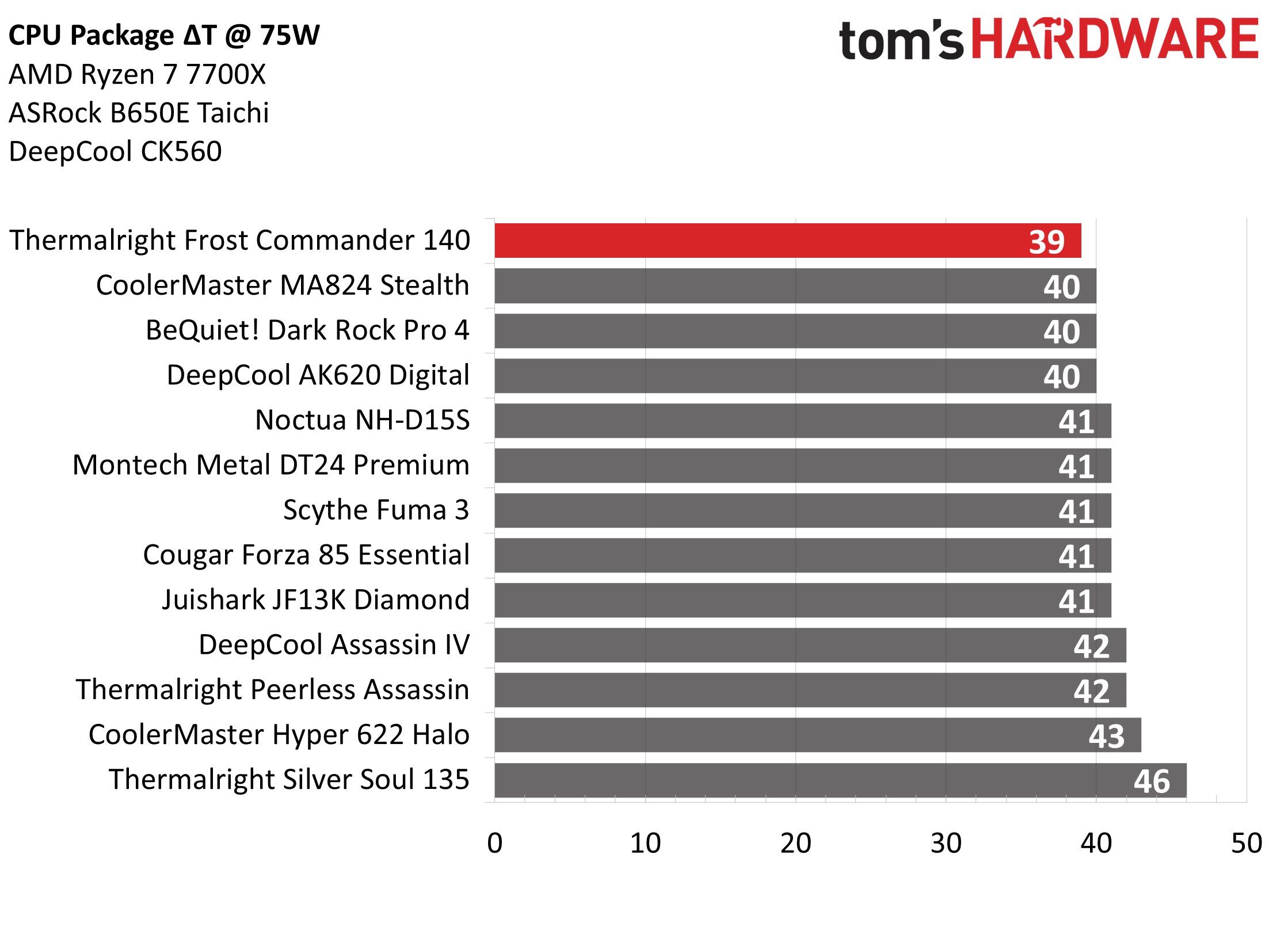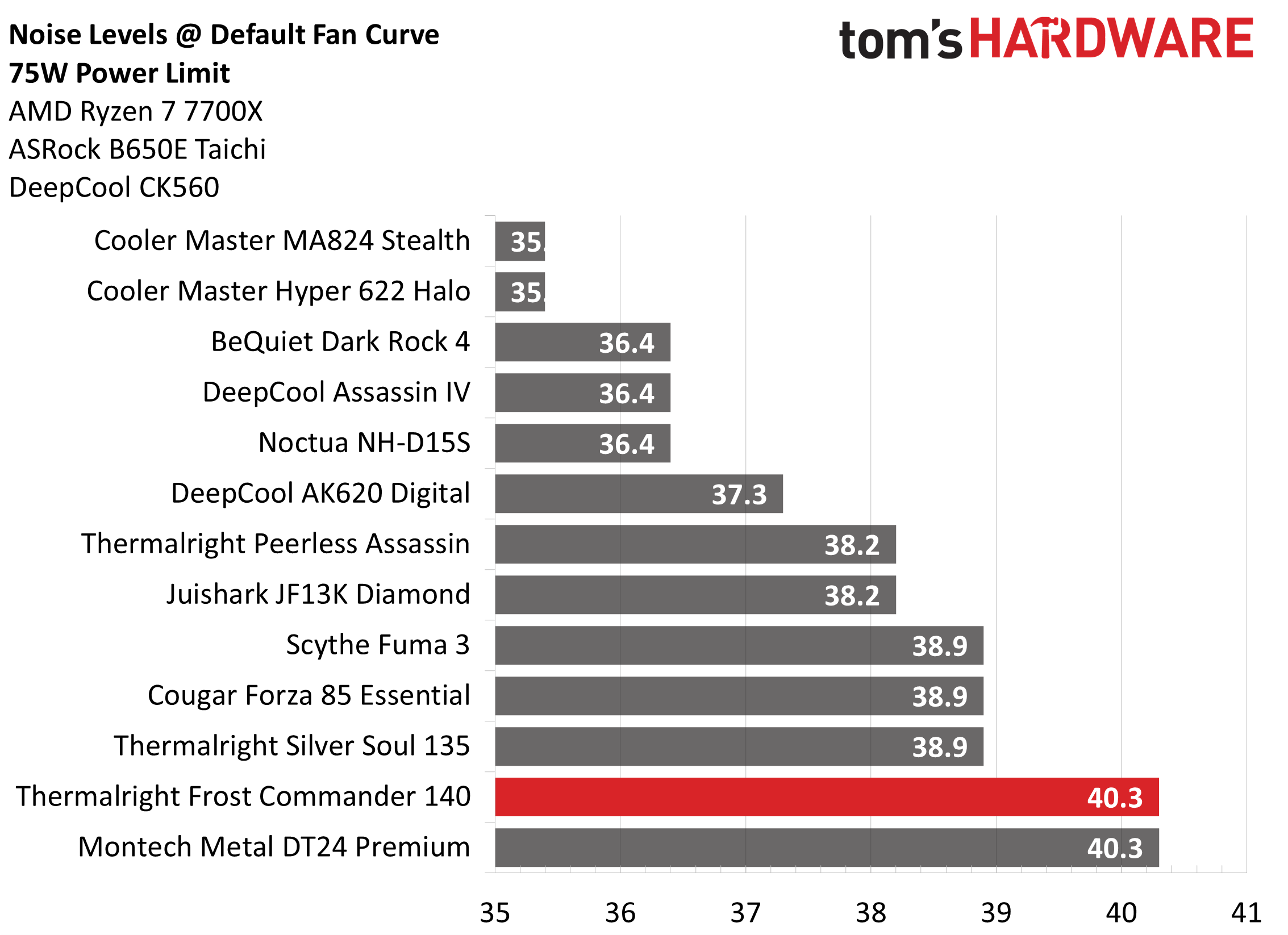Why you can trust Tom's Hardware
Thermal Results with noise normalized to 38.2 dBA
Finding the right balance between fan noise levels and cooling performance is important. While running fans at full speed can improve cooling capacity to some extent, the benefits are limited and many users prefer a quiet system.
With this noise normalized test, I’ve set noise levels to 38.2 dBA. This level of noise is a low, but slightly audible, volume level for most people. Thermalright’s Frost Commander has the best air cooling result I’ve ever seen on an air cooler when set to these low noise levels, essentially on par with DeepCool’s LT720 360mm AIO.
No Power Limits Thermal Results
Without power limits enforced on Intel’s i7-13700K, the CPU will hit its peak temperature and thermally throttle with even the strongest of air coolers. In this test, we measure the total amount of watts the cooler is able to dissipate from the CPU.
Thermalright’s Frost Commander 140 absolutely murders in this maximum intensity scenario, cooling an average of 240W during the course of testing. This is the best result I have ever seen from an air cooler. The CPU ran almost unthrottled during this test, maintaining maximum all-core clocks on all but 4 of its 16 cores – and the 4 cores which throttled only did so by 100mhz.
This level of performance isn’t an easy feat though. With noise levels of 46.9 dBA, the Frost Commander 140 runs a bit louder than competing coolers (from Noctua & DeepCool) in this performance class, which generally run closer to 43.4 dBA. But, the noise-normalized results shown earlier demonstrate that Thermalright’s cooler is still capable of achieving top-tier cooling if you prefer to limit its noise levels.
175W Cinebench Results
Most coolers on the market are able to keep Intel’s i7-13700K under it’s peak temperature if the power consumption is limited, so for this test we’ll be looking at the CPU’s actual temperature.
125W Cinebench Results
The lowest power limit I test with Raptor Lake CPUs is 125W. This is a high enough limit to allow the CPU to maintain it’s base clockspeeds even in the most intensive tests, and most coolers should be able to keep the CPU below Tjmax – even low-end coolers.
Get Tom's Hardware's best news and in-depth reviews, straight to your inbox.
As with all of our previous thermal results, Thermalright’s Frost Commander 140 yet again delivers the best thermal results of any air cooler we’ve tested. Its noise levels are good in this restricted scenario – at 38.5 dBA it’s slightly louder than Noctua’s NH-D15S and slightly quieter than Scythe’s recently released Fuma 3.
AMD Ryzen 7 7700X Thermal Results
It’s great to see how coolers perform with hotter CPUs like Intel’s i7-13700K, but that performance doesn’t always directly translate to how other CPUs will operate with the same coolers. Some coolers might perform better – or worse – depending on the CPU it’s paired with. Today’s review I’ve includes AMD’s Ryzen 7 7700X to show how coolers might respond with more commonly used CPUs.
Thermal Results with noise normalized to 36.4 dBA
With our i7-13700K results, Thermalright’s Frost Commander provided the best noise-normalized results. But with our Ryzen results here, the results are good but not chart-topping like we saw with our Intel system. There are a few different factors that might contribute to this discrepancy.
First, with our Intel results, noise levels are set to 38.2 dBA – which is a very low noise level. With our AMD system, our noise-normalized results are tuned for an even quieter noise level of 36.4 dBA. This might mean that the fans of Thermalright’s Frost Commander 140 simply don’t perform as well when set to the lowest noise levels.
Another factor that might explain these discrepancies are the cases used for testing. The Intel system is tested in BeQuiet’s Silent Base 802, which incorporates noise-dampening features. My AMD system, which uses DeepCool’s CK560, doesn’t have those noise-dampening features.
The Silent Base 802 has higher minimum noise levels at 37.3 dBA, but also higher levels of airflow. DeepCool’s CK560 has lower levels of airflow, but runs so quietly that I can’t measure its noise level – it runs quieter than the lowest level my sound meter is capable of measuring.
Lastly, differences in thermal density might also be at play. Intel’s i7-13700K features a total of 16 cores produced on the Intel 7 manufacturing process, whereas the Ryzen 7700x features 8 cores on the smaller TSCM 5nm manufacturing process. In other words, the heat produced by Intel’s CPU is spread out over a larger area, whereas it’s concentrated in a smaller area on AMD’s Ryzen 7700X.
Maximum Cooling Capacity with maximum fan speeds
Next up we wanted to see how the cooler handles a maximum heat workload, so we let the fans run at their full speeds. With 129W measured, The Frost Commander’s performance is among the best results we’ve seen from an air cooler. While DeepCool’s and Montech’s coolers technically cooled 1W more with a measurement of 130W, I consider this difference to be within the general margin of error.
However, the Frost Commander’s noise levels were not impressive – at 48.5 dBA, this is the loudest result I’ve recorded thus far on my AMD Ryzen cooler testing setup. Readers might note that these maximum noise levels are higher than those shown for the Intel system. That is because the Intel system’s case has noise-dampening features, but the AMD system’s case does not, as previously stated.
Thermals and Acoustics with a 95W Power Limit
You won’t always push your CPU to its absolute limits or maximum power draw, so it’s a good idea to test coolers across different power limits. For a user of AMD’s Ryzen 7700X, 95W will represent loads more demanding than gaming but less demanding than rendering. In these scenarios, noise levels are generally considered more important than cooling performance.
When it comes to thermals, the Frost Commander 140 does exceptionally well. With a measurement of 50 C over a 23 C ambient temperature, this is the second-best air cooling result we have for AMD’s Ryzen 7700X. Unfortunately for Thermalright, it’s also the loudest result we have for this benchmark test. It’s not exactly loud at 46.3 dBA (generally I’d consider that a moderate noise level), but this isn’t a great result when you consider that literally every other result we have tested is quieter.
Thermals and Acoustics with a 75W Power Limit
With power draw reduced to 75W on AMD’s Ryzen 7 7700X, this thermal load shouldn’t be difficult for most coolers to cool. This is roughly the amount of power Ryzen 7 7700X CPU will use during gaming, and it’s also the maximum power consumption of AMD’s non-X Ryzen 7 CPU.
At this lower level of power consumption, cooling difficulty isn’t hard at all and even the most basic coolers should have no problems here. So temperature isn’t important – noise levels are much what’s worth noting. That being said, the Frost Commander’s performance here was the best we’ve seen from any air cooler – edging out the competition by a single degree with a result of 39 degrees over a 23 C ambient temperature.
When tied to the default fan curve of ASRock’s B650e Taichi, noise levels reached 40.3 dBA. This noise level is comparable to that of a low hum, so it shouldn’t bother most folks – but it does tie with Montech’s Metal DT24 Premium for the loudest result we’ve seen in this test.
Conclusion
Thermalright’s Frost Commander 140 provides the best performance per dollar of any air cooler I’ve tested. For only $50, it provides top-tier air cooling performance on par with coolers like Noctua’s NH-D15. Its results with our Intel i7-13700K system were the best we’ve seen from any air cooler.
However, if you’re not running a case which includes noise-dampening features it can run up to 48.5 dBA, which is the loudest we’ve recorded from any air cooler. We can forgive this given its budget price and unexpectedly strong performance. But you’ll want to limit its fan speeds if noisy coolers bother you.

Albert Thomas is a contributor for Tom’s Hardware, primarily covering CPU cooling reviews.
-
Albert.Thomas Addendum: I'm testing BeQuiet's new Dark Base Pro 901 computer case right now, using Thermalright's Frost Commander 140 to test it's noise reduction features.Reply
In this setup I've got Intel's i9-13900K - which can push more watts than the i7 featured in this review - and depending on the system fan settings, Thermalright's Frost Commander 140 is cooling 265W +-5W with Intel's i9-13900K. -
Math Geek just a few more $ than the peerless assassin and it sure looks like a winner to me.Reply
even swapping out some quieter fans and your still well below the cost of the other top air coolers by a long shot. -
-Fran- Thanks for the review as always, Albert.Reply
Looks like there's a new kid in the block, walking all hung ho, heh.
Regards. -
dannyboy3210 That certainly looks like an interesting cooler.Reply
Just to check, should the first chart on page two (Thermal Results with noise normalized to 38.2 dBA) have the Thermalright Peerless Assassin?
I don't see it there although it appears to be in most of (if not all) the other charts. -
cyrusfox Nothing better than a big slab of metal. the heatsink alone is 1kg!If you got the space for it, this makes a lot of senseReply -
Albert.Thomas Reply
You'll find it in the noise normalized results for Ryzen 7 7700X, but I forgot to do the noise normalized testing when I retested it on the i7.dannyboy3210 said:That certainly looks like an interesting cooler.
Just to check, should the first chart on page two (Thermal Results with noise normalized to 38.2 dBA) have the Thermalright Peerless Assassin?
I don't see it there although it appears to be in most of (if not all) the other charts. -
Albert.Thomas Reply
Hmm, maybe I'll have to do some fanless testing on it :DAmdlova said:My be can run passively on 35w cpu -
Lucky_SLS ReplyAlbert.Thomas said:Hmm, maybe I'll have to do some fanless testing on it :D
That would gives us the qualitative number on how much heat the heatsink design can soak up. The rest is upto the surface area, airflow and convection for cooling. This gives me a cool idea:
maybe add in other fancy stuff like:
scanning the heatsink and giving us surface area numbers - coldplate, heatpipe and finstack
have schlieren imaging to see the airflow
